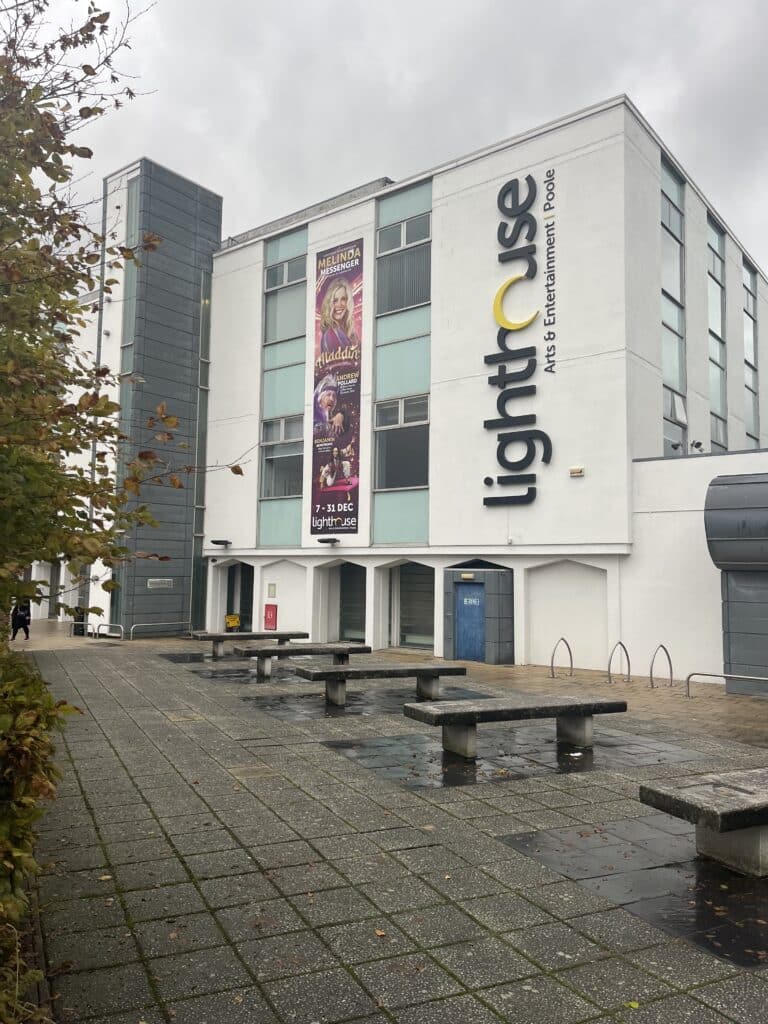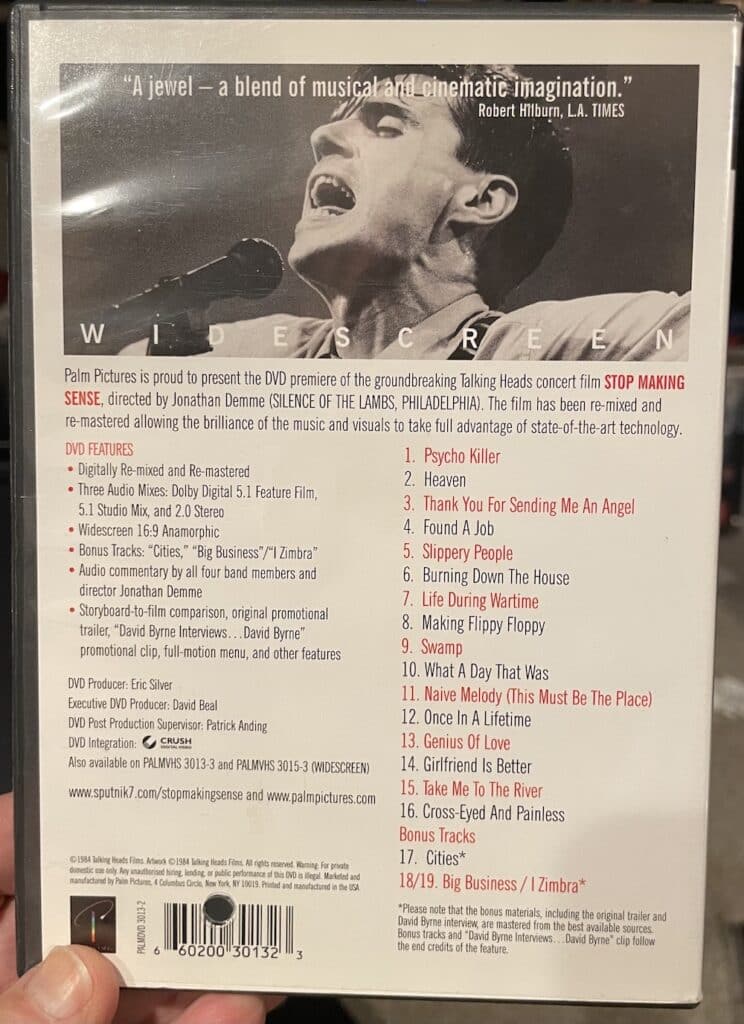On Saturday, October 28, 2023, Poole Lighthouse screened the fortieth anniversary showing of Stop Making Sense, the momentous moment in musical history when a series of recorded concerts were edited together into a film to replace a tour. Independent cinema is again giving a clear lesson to the more commercial outlets that nothing can replace quality.

The name of the band is Talking Heads. Formed in 1975 as a cover band while at Rhode Island School of Design they went on to become one of the most influential bands in musical history. They stand as a testament to the power of innovation, artistic expression and the ever-evolving nature of music. Comprising David Byrne, Chris Frantz, Tina Weymouth, and Jerry Harrison, this band emerged from the New York City punk scene, forging a unique and instantly recognisable sound that blended elements of rock, funk, new wave, and world music.
The band’s early sound drew heavily from punk rock, but it also exhibited a distinctive quirkiness and intellectual sensibility that set them apart. Their debut album, “Talking Heads: 77” (1977), showcased Byrne’s idiosyncratic lyrics and staccato vocal delivery, while the rhythm section of Weymouth and Frantz laid down infectious grooves. One of Talking Heads’ most remarkable attributes was their commitment to innovation. Albums like “More Songs About Buildings and Food” (1978) and “Fear of Music” (1979) witnessed their musical exploration. The band incorporated elements of funk, African rhythms, and electronic experimentation, pushing the boundaries of rock music. Their collaboration with legendary producer Brian Eno on albums like “Remain in Light” (1980) yielded a groundbreaking fusion of polyrhythmic grooves and avant-garde sensibilities. Byrne’s distinct vocal style, characterised by its detached and somewhat anxious delivery, became a signature element of their sound. This approach allowed him to address complex themes through the lyrics while also creating an emotional distance that invited listeners to engage intellectually.
The themes of identity and authenticity were recurring motifs in Talking Heads’ music. Byrne’s lyrics often explored issues of self-perception, disconnection and the search for authenticity in a modern world filled with artificiality and conformity. The song “Once in a Lifetime” from “Remain in Light” reflects this theme, with Byrne asking, “Well, how did I get here?” The band’s art school background and the influence of avant-garde and outsider art were evident in their music and visuals, creating a sense of artistic authenticity that was both unconventional and relatable.
Talking Heads’ innovative approach extended beyond their music to their live performances and music videos. Their collaboration with director Jonathan Demme on the concert film “Stop Making Sense” (1984) is often considered one of the greatest concert films ever made. It captured the band’s energetic and visually engaging performances, highlighting their eccentric style and Byrne’s unique stage presence. The minimalistic, yet highly choreographed, stage design in the film emphasised the band’s artistic sensibilities and the power of their live shows. This show, which was a replacement for touring the band in the mid 1980’s has become quite literally one of the best, if not the best, concert films ever made.
It was filmed over three nights in late 1983 at Hollywood’s Pantages Theatre and contained a set list that, from beginning to end, captured the brilliance of the band. The four core members of Talking Heads are joined by the backing singers Lynn Mabry and Ednah Holt, the guitarist Alex Weir, the keyboardist Bernie Worrell and the percussionist Steve Scales.

From David Byrne’s entrance at the outset with the immortal line, “Here’s a tape, I want to play you,” and his acoustic launch in to Psycho Killer through the bliss of ‘Heaven’, the dance track ‘Slippery People’, the anti war song ‘Life During War Time’, the psychological shakedown of ‘Burning Down the House’, the divinity of ‘Once in a Lifetime’, that suit in ‘Girlfriend is Better to the perfect ending in ‘Cross Eyed and Painless’ this is just over one hundred minutes of bliss. My only criticism of the films viewing this Saturday eve, was that it was not loud enough. Many agreed. It needed more decibels to lift people up and into bop mode.
Some of the treats:
Another notable moment in the film is the only song without David Byrne on the stage. In 1981, husband-and-wife team Chris Frantz and Tina Weymouth formed a side-project group called the Tom Tom Club and here they get to perform one of their hits, “Genius of Love.” Even if you don’t think you know this song, you definitely know the riff. It was sampled in Mariah Carey’s 1995 hit “Fantasy” and is one of the most iconic riffs of all time. Despite Byrne being the legendary frontman that he is, Weymouth and Frantz bring so much energy to their performance of this song. This is one of my personal favourites. Frantz is magnificent from behind the drum kit and Weymouth is fabulous on the main vocals and bass.
People who say they love music have to at least experience Stop Making Sense. Turn up the volume and embrace the fusion of sounds. You will not regret it. Talking Heads’ impact on the music world is immeasurable. Their experimentation with genres, the fusion of world music into their sound and their willingness to challenge the status quo of rock and pop music have influenced countless artists. As a youth, I frequented many different types of nightclubs. However, there was always one Talking Heads track that every one of these clubs could approve of. This eclectic nature made Talking Heads enduring and because of this, they will eternally remain in light.
Jason Cridland
If you would like your interests… published, submit via https://dorseteye.com/submit-a-report/
Join us in helping to bring reality and decency back by SUBSCRIBING to our Youtube channel: https://www.youtube.com/channel/UCQ1Ll1ylCg8U19AhNl-NoTg SUPPORTING US where you can: Award Winning Independent Citizen Media Needs Your Help. PLEASE SUPPORT US FOR JUST £2 A MONTH https://dorseteye.com/donate/







